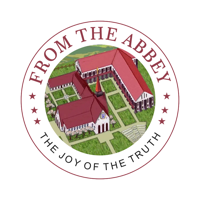
Growing in the Theological Virtues – Hope Means Learning to Trust
Spiritual growth means growth in the theological virtues. Theological virtues are directly related to our relationship with God. God leads us to a relationship with him based on the way that human relationships work. Sure, he could just “zap” us in to intimacy with Him. But he chooses to approach us in ways that are true to our nature because he wants us to fully participate in this relationship. God doesn’t want blind following pets. He wants real children who freely choose to have a relationship with him. Growth in the theological virtue of hope is the starting point of a deeper relationship with God.
Every human relationship begins with trust. Early relationships are all about trust building. When I met my wife Jodi, we spent most of our time talking and getting to know each other. Our early discussion established that we had a lot in common, but more importantly they built up a trust between us. As our relationship grew more serious and the trust between us solidified, our attempt to know each other grew in intensity. After we were engaged we actively sought out marriage preparation material that would increase our intimacy and that would teach us how to be truly committed to each other. That’s the rhythm of relationship building – trust builds intimacy which leads to commitment and all of this lays the foundation for a growing love. But until trust is established as a firm foundation for the relationship, these other parts of human relationship cannot flourish.
On the big-picture level, God began re-establishing his relationship with humanity after Original Sin through Abram / Abraham. If you look at the story of Abraham, you can see that it is completely about establishing trust.
- God asks Abram to leave his home & family and “go wherever I tell you.”
- God promises Abram land while Abram is a “wandering Aramean.”
- God promises Abram descendants that number as many as the stars when Abram is childless and his wife is beyond childbearing years
- God tells Abram to sacrifice his only son Isaac – the only way for God’s promise of descendants to be fulfilled
We also see Abram struggle and succeed to trust God. He grows in trust through his experience. Ultimately, his willingness to sacrifice Isaac shows that he has radically learned trust and obedience (two very related virtues).
In your own spiritual journey, God will bring you through the same relationship-building process through the theological virtues. The first step is to learn to trust God. Once a foundation of trust is built, then we can advance in our relationship with him.
The theological virtue of hope is the virtue that builds trust. It is the trust that God wants a relationship with us. It is the trust that God wants us eternally united to him in Heaven and that he will give us the grace we need to get there. Without the assurance that we can get to Heaven, that we can be united to God, that he wants us to “make it,” there would be no motivation to seek a deeper relationship with him. So we need to come to trust not only that God will lead us to Heaven (as long as we do our part), but that he
- Has our best interest at heart even when it doesn’t look like it
- Is active in the world even when things seem random and unplanned
- Does not create evil or cause it to happen
- Allows evil to happen due to free will, and sometimes due to greater good that comes out of it
- Has bigger plans for us than this world reveals
- Is always truth, goodness, beauty and love
Once we believe these things, we can move forward in the theological virtues and come to know him more intimately through the theological virtue of faith.


[…] is a necessary virtue for spiritual growth because trust is the first part of any relationship. While the theological virtue of hope means trust in any promise that God makes us, it is primarily […]
[…] we’ve seen in this series, spiritual growth requires us to grow in the virtue of hope, which means to trust God. The alternative to hope is to fall into either despair or presumption. Despair robs the joy out of […]
[…] main goal of spiritual growth is to grow in our relationship with God. The first step of any human relationship is to build trust. As trust strengthens, our relationship grows in the security necessary to open ourselves in […]
[…] Just as God leads us through spiritual growth in a way that harmonizes with human nature, he also led humankind through salvation history in the same way. We saw how God taught Abram to trust him, instilling salvation history in the virtue of hope. […]
[…] at the service of the theological virtue of charity. The very purpose ofthe theological virtues of hope – to teach us to trust – and faith – to give us intimacy – is to prepare us to […]
[…] is the greatest of the theological virtues. Hope and faith are at the service of charity. The very purpose of hope – to teach us to trust – and of faith – to give us intimacy – is to prepare us to […]
[…] Hope fully lived is complete trust in God. Do you trust God completely? […]